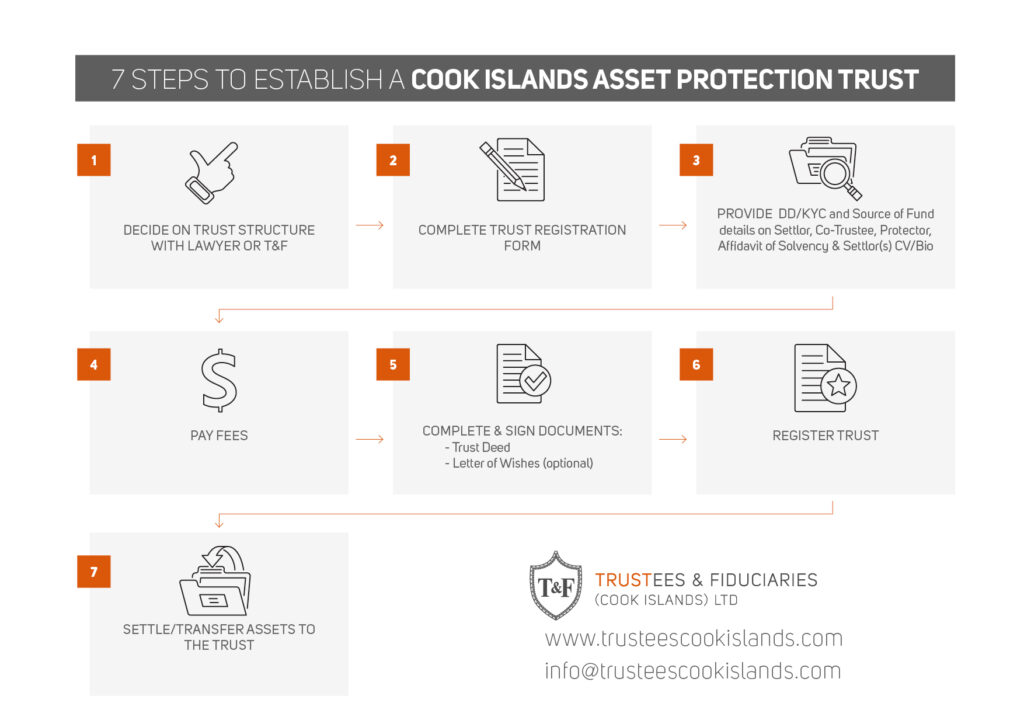Establishing a Cook Islands Trust is not a complicated process however, it is advisable that you speak to your attorney before proceeding.
When it comes time to establish the trust, we highly recommend using our standard trust document which has been specifically designed to ensure that it meets all Cook Islands legal requirements. This document can either be adopted in its current form or your attorney may work with you to make any changes necessary.
The next steps to be taken are to identify the parties involved in the structure of the trust and that the correct information is provided to the Cook Islands trustee.

A trust registration form provided by T&F will be required to be completed providing all the necessary information and documentation required to register the Cook Islands Trust. That includes:
- Name of Trust
Any name can be chosen as long as it is not offensive and does not include words such as “bank” or “insurance” which may mislead third parties about the dealings of the trust. - Details of Settlor/Grantor
The settlor / grantor is the person who establishes the trust by making a gift of property ($10 initially and then the transfer of funds for the investment or settlement of other assets) to the trustee upon the terms of the Deed of Trust. Also known as the Grantor. - Trustee
The Trustee of a Cook Islands trust must either be a resident Trustee company or a Private Trustee Company (usually an International Company) registered in the Cook Islands. The Trust can appoint a co-Trustee who may be resident outside of the Cook Islands. - Protector.
The choice of the Protector is very important. The Protector oversees the operation of the Trust and has the ability to remove the trustee and appoint a new trustee. The Protector can also prevent the trustee from making distributions or amending the trust agreement. It is not recommended that the settlor choose to be the Protector themselves and it is highly recommended that the Protector appoint an offshore Protector if any threat of litigation emerges. Where a PTC is used T&F can provide independent Protector services. Please ensure that full contact details are provided as the Trustee will need to be able to communicate directly with the Protector. - Beneficiaries
Beneficiaries are the persons who can benefit from the trust. In this section include other family members that you would like to potentially benefit from the trust. Usually this would be your spouse and children, but may also include wider family members such as parents, brothers, sisters, cousins, spouse’s family members etc. Each beneficiary should be individually named, and their date of birth and physical address provided. - Professional Advisors
The advisors are responsible for monitoring the performance of the trust investment. The advisors can advise the trustee on any matter concerning the trust, but in particular is expected to provide advice on distributions, and as to when and if the trustee should make an investment switch to another fund. Often the settlor, but can be another family member or a professional advisor. - Trust Assets. List assets that are to be settled on the trust. Proper settlement procedures must apply to safeguard the assets under the Cook Islands asset protection regime. A sum of USD10 will be listed as the initial settlement. Other assets can be settled after the establishment of the trust is completed.
Once the registration form is provided together with verification of identity, source of funds details, signed trust document the trust is registered. The settlor must then fund the trust by completing a transfer of assets to the trust.
Anyone can set up a Cook Islands trust, if you are interested in a Cook Islands trust, contact us today for more details at info@trusteescookislands.com or visit our website at www.trusteescookislands.com.




